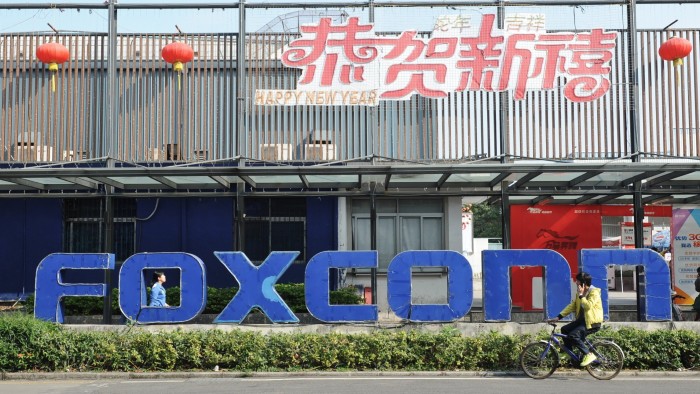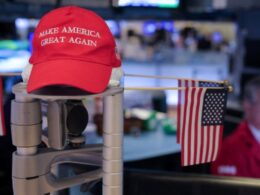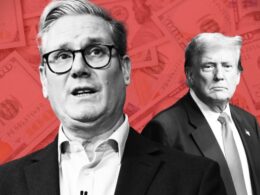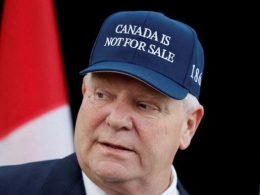Shares in top US companies including Apple, Amazon and Tesla tumbled in after-hours trading on Wednesday as Donald Trump’s sweeping tariff regime threatened widespread upheaval to global supply chains.
Technology companies were among the hardest hit in initial market reaction, with contracts tracking the Nasdaq down 4 per cent. Apple, which is heavily exposed to additional tariffs on China, saw its shares plummet 7 per cent, with Amazon down about 6 per cent.
The escalation of Trump’s global trade war poses a significant risk to tech supply chains, after top executives spent months courting the president in an effort to soften or gain exemptions from policies that could hit their bottom line.
Tech companies were not the only ones suffering late on Wednesday. Shares in big retailers and consumer brands also sank after Trump’s tariffs announcement, with Walmart dropping 7 per cent. Target fell more than 5 per cent and sports apparel group Nike was off by 7 per cent in after-hours trading.
A 10 per cent universal tariff on all countries will apply from midnight eastern time on April 5, while higher “reciprocal” tariffs, which apply to multiple geographies including the EU, China, the UK, Japan and South Korea, are set to take effect from midnight eastern time on April 9.
Wedbush analyst Daniel Ives wrote the spree of new tariffs was “worse than the worst case” scenario that markets feared. “Tech stocks will clearly be under major pressure on this announcement [over] worries about demand destruction, supply chains and especially the China and Taiwan piece of the tariffs.”
An executive at a Big Tech company said that operating under the current administration was like “trying to hit a moving target”. “I’m more worried he’s going to break the US economy” than any one set of tariffs, the person said.
Apple declined to comment on whether there was any prospect of it securing a carve-out from the new tariffs, as it managed to do during Trump’s first term. A White House spokesperson confirmed there were no exemptions for Apple in the president’s executive order.
Tim Cook, Apple chief executive, is walking a geopolitical tightrope, with the company’s supply chains tightly bound to China, where the likes of Foxconn pump out millions of iPhones each year. A $500bn spending plan announced in February was seen as an attempt to placate Trump.
Apple ships roughly 50mn iPhones to the US each year, with the vast majority made in China. The iPhone remains the company’s flagship product and accounts for more than half of its total revenue, with its Mac, iPad, wearables and fast-growing services business making up the rest.
Trump announced he would be imposing a “reciprocal” 34 per cent tariff on Chinese imports — on top of a 20 per cent tariff he has already imposed — as well as 26 per cent on India and 46 per cent on Vietnam, where Apple also manufactures.
The unilateral move affecting multiple crucial manufacturing countries would not only affect Apple’s close supply chain relationship with China, but also blunt any benefits from its attempts to diversify its manufacturing base elsewhere.
Amazon has similarly engaged in a recent campaign to woo Trump, having faced the president’s ire during his first term. Company founder Jeff Bezos attended Trump’s swearing-in ceremony and has dined with him several times in recent months.
The Seattle-based conglomerate is dependent on Chinese imports to stock its warehouses, and about a quarter of its retail arm’s costs are tied to China, according to Morgan Stanley analysts.
Nvidia shares, meanwhile, shed more than 5 per cent after-hours, despite the White House clarifying that semiconductors would be exempt from the reciprocal regime for now.
The chip giant relies on Taiwan Semiconductor Manufacturing Company to manufacture its cutting-edge artificial intelligence chips, whose sales have propelled the company to lofty valuations in the last two years.
Nvidia, whose chief executive Jensen Huang similarly promised hundreds of billions of dollars in spending in the US over the next four years in an interview with the Financial Times last month, declined to comment.
TSMC shares were down about 6 per cent in after-hours trading. The company recently committed to investing an additional $100bn in US chip manufacturing.
Meta shares were meanwhile down around 5 per cent. It has previously warned that its China advertising revenues could be hit in the event of an escalating trade dispute with the US.
Trump also confirmed that 25 per cent tariffs will be imposed on all foreign-made cars and parts at midnight, hitting the stocks of all US carmakers.
Shares in Tesla fell 8 per cent in after-hours trading as investors worried about the impact on its global supply chain, as well as the prospect of retaliatory tariffs on the world’s largest electric vehicle maker.
Last month Tesla warned that the cost of making cars would increase because “certain parts and components are difficult or impossible to source within the US” and American vehicles would become less competitive overseas.
A White House factsheet said that cars and car parts “already subject to tariffs”, copper and “certain minerals that are not available in the US” would be exempt, without providing more details.
Daniel Newman, chief executive of The Futurum Group, described Trump’s move as a “rip the Band-Aid-off moment” for tech investors who have been jittery for weeks.
“You’re watching the market react and you’re going: the whole world has basically become completely dependent on us having this very accessible economy,” he said.
For retailers, the share moves came despite years of effort to diversify their supply chains after Trump placed heavy tariffs on imports from China in his first term. Suppliers to the Home Depot, the largest home improvement chain, moved some production to south-east Asia, Mexico and the US, chief executive Ted Decker said last month.
Target has shifted production of apparel out of China and increasingly to Central American countries such as Guatemala and Honduras, chief commercial officer Rick Gomez said last month. Trump hit Guatemala and Honduras with 10 per cent tariff rates on Wednesday.
Target declined to comment.
“These newly announced tariffs — and the expected retaliatory tariffs on American businesses — risk destabilising the US economy, undermining the goals of bolstering domestic manufacturing and growth,” said Michael Hanson, senior executive vice-president at the Retail Industry Leaders Association, which counts Target as a member.
The new tariffs sparked an immediate push for special relief. The Consumer Brands Association, whose members include food manufacturers PepsiCo, Mondelez and Kraft Heinz, petitioned to exempt certain “critical ingredients” from the levies.
“We encourage President Trump and his trade advisers to fine-tune their approach and exempt key ingredients and inputs in order to protect manufacturing jobs and prevent unnecessary inflation at the grocery store,” the association said.
Additional reporting by Rafe Uddin, Hannah Murphy and Alex Rogers
Source link









